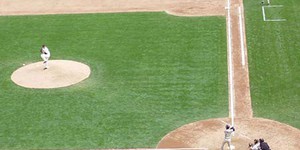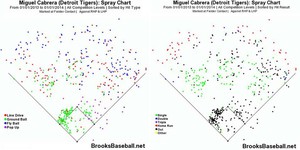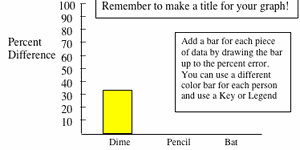Others Like “How Do Baseball Stadium Dimensions Affect Batting Statistics?” (top 20 results)
|
Here's a project that will teach you about math as you follow some of your favorite players or teams. You'll be comparing day-to-day performance with long-term averages, and trying to determine if the "streaks" and "slumps" over shorter time periods are due to random chance or something else. When you've finished, you'll have a better understanding of some important concepts in statistical analysis and baseball.
If a player goes 0-for-20, does that mean anything? Using probability theory,…
Read more
So baseball's your game? Well, slugger, science and math abound in baseball. Just look at the zillions of "stats." In this project, you can produce some interesting baseball statistics of your own and perhaps settle a long-standing debate. You'll set up experiments at your local playing field to find out which type of bat is better, wood or aluminum. Play ball, and batter up!
Read more
Here's a sports science project that shows you how to use correlation analysis to choose the best batting statistic for predicting run-scoring ability. You'll learn how to use a spreadsheet to measure correlations between two variables.
Read more
In baseball, coaches use hit charts to track the results of every hit each player makes, giving a measure of the player's performance. Have you ever wondered what things affect where a baseball goes when a player hits it with a bat? In this project you will set up an experiment to hit a ping pong ball in a controlled manner using a toy catapult, then learn about the physics of baseball by making your own hit chart.
Read more
Do corked bats really hit the ball further? What about other materials? Here's a project to find out.
Read more
Tennis racquets, baseball bats and golf clubs all vibrate when they hit the ball. You can often feel it in your hands, particularly if you "mis-hit" the ball. You can find the point(s) on your racquet, bat or club—called the "sweet spot"—that minimize unwanted vibrations. Low-tech method: hang the racquet or bat straight up and down with a string from its handle. Lightly hold the handle with your thumb and forefinger and have a helper sharply tap the bat, strings or club face…
Read more
This project shows how mathematical probability sometimes contradicts our intuition. Despite the fact that there are 365 days in a year, if you survey a random group of just 23 people there is a 50:50 chance that two of them will have the same birthday. Don't believe it? Try this project and see for yourself.
Read more
Measurements are very important for scientists. It is especially important that the measurements be accurate. Think about how important accuracy is when you want to know if you are taller than a friend of yours, every inch counts! In this experiment, you will investigate how different objects can be measured with accuracy. Are small or large objects more difficult to measure? Who in your family is the best at measuring? Maybe it will be you!
Read more
When watching a football game, have you ever wondered why some kicks lead to a successful field goal and others do not? There are a lot of variables at play in a game of football, and many of them are related to physics. One variable that can affect whether a field goal is successful is distance. In this science project, you will explore how field goal success rate is affected by distance from the goalposts. What will be the best distance for you to kick some field goals? Grab a football, head…
Read more
What makes a winning team? Getting all the best players? Good coaches? Good chemistry? This project will show you how you can use math to help you test your hypothesis about what makes a winning team.
The Pythagorean relationship is a fundamental one in sports: it correctly predicts the records of 98% of all teams. But in 2% of cases, it fails. Why does it fail? Find teams that deviated substantially from their expected Pythagorean record (this information is available for baseball teams…
Read more
|
Explore Our Science Videos
Raspberry Pi Adaptive Game Controller
How Much Weight Can Boats Float?
DIY Mini Drone Part 1: Build Your Drone









